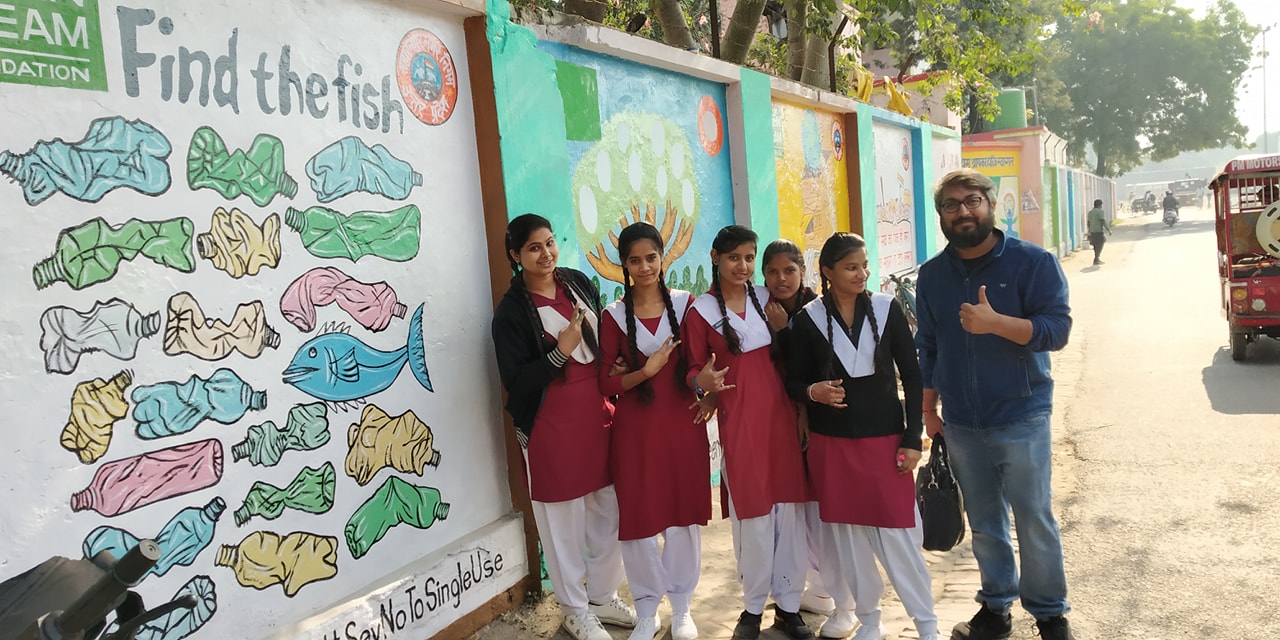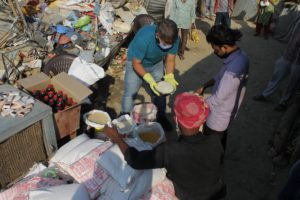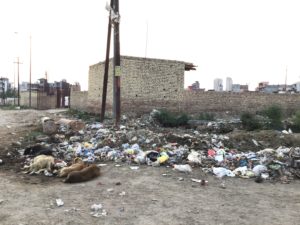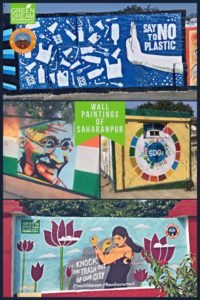
Green Dream Foundation Founder Ashish Sachdeva with students in Saharanpur
The contributions of India’s vibrant civil society organizations to urban and rural waste ecosystem are well-documented. With waste collection mainly relegated to informal waste-pickers, ragpickers, and kabadiwalas, the role of these organizations in promoting the workers’ socio-economic rights is commendable. Over the decades, waste collection, segregation and disposal systems have also benefited immensely through their interventions.
One such organization is the Green Dream Foundation, an environmental NGO actively involved in raising critical issues of waste management through its education and advocacy campaigns since 2011. We spoke to the Founder of Green Dream Foundation, Ashish Sachdeva.

Can you please tell us about the Green Dream Foundation and its involvement in the waste sector?
Green Dream Foundation works in the areas of waste management, water conservation, air pollution, and climate change. We do this through education and advocacy campaigns as well as community engagement. We also do consultations and collaborate with the public and private sector to provide tangible waste management solutions to a variety of stakeholders such as Resident Welfare Associations (RWAs) and bulk waste generators.
During the lockdown, several NGOs, including the Green Dream Foundation, came forward to provide essential aid and protective gear to the most vulnerable people within the waste management hierarchy: waste-pickers. You also emerged as a prominent voice in raising awareness on critical waste management issues in this period. How did your organization adapt so quickly to the changed circumstances?
Every organization needs to be agile and understand the realities of the current situation. These days, everyone within the environment sector realizes the significant impact of coronavirus. In pre-COVID times, Green Dream Foundation had worked extensively with informal waste pickers. We used to focus on livelihood generation and social inclusion but as soon as the lockdown was announced, we raised funds through crowdsourcing to provide essential groceries and safety gear to 700 families in Noida where we are based. Unfortunately, after two months of lockdown, these informal workers have exhausted their resources. Financial aid is dwindling and authorities are pushing them to return to their villages. Waste-pickers are one of the most essential service providers and need our support more than ever before.

Also, to continue our education and advocacy activities, we realized that visiting residential communities was impossible during the lockdown. Thus, online engagement was our only option. Green Dream Foundation organized a series of webinars in partnership with Smart Cities India 2020 Expo. We invited prominent people from Urban Local Bodies (ULBs), the private sector, and a range of other stakeholders to discuss issues related to waste segregation, decentralization, etc. It was a major success and we were able to reach out to 5000 people during the last two months.
The pandemic has exacerbated existing vulnerabilities in our fragile waste management system. What were your observations while you were out on the streets of Noida during the lockdown?
Soon after the pandemic struck, authorities like the Central Pollution Control Board (CPCB) released elaborate guidelines on handling hazardous COVID waste. At the ground level, however, we did not notice enforcement of these rules. Informal waste pickers (who have always been vulnerable and exposed to various infections due to lack of protective gear) continued to work without any Personal Protective Equipment (PPEs) post-COVID too. In addition, we observed many municipal sanitary workers were also segregating contaminated mixed waste manually at the Material Recovery Facilities MRFs). We have photographic evidence of this and informed Noida Authority of the same.
Admittedly, waste pickers in India have never used safety equipment. This continued post-COVID as well. Considering there is no shortage of PPEs, this was initially baffling to us but we soon realized that there was a lack of awareness at the ground level. The waste pickers had no idea how deadly this virus is. One basic workshop by municipal authorities hardly had any impact. The waste-workers needed constant reminders and supervision, which is what we started doing – and continue to do so.
The pandemic has contributed to a spike in plastic waste generation. How much of an impact is this having at the ground level?
A lot of good work that had been done by environmentalists in recent years has been wasted and the return of single-use plastic is a big cause of concern. A lot of people use single-use, surgical masks thinking they are made of cloth since they are soft – but the fact is, they are made of polypropylene, which is plastic. These days, masks and gloves are littered on the streets which is dangerous since it can spread infection. The most important of the 3Rs (Reduce, Reuse, Recycle) is Reduce. This means we have to try to reduce the waste at source as much as possible and use reusable masks and gloves.
During my webinars, I also realized that during the lockdown, cities that were faring well in terms of waste management continued to perform well, while cities that already fared poorly failed to manage their waste. Unfortunately, most cities are not focussing on implementing the Solid Waste Management Rules of 2016. Instead, they are collecting waste to transfer to landfills. I have personally spoken to municipality officials, who admit that they are unable to manage the increase in hazardous COVID waste due to limited infrastructure.

You are very critical of ULBs…
The most difficult step in achieving waste segregation is changing the mindset of the public. Surprisingly, in India, the opposite is happening. I find that residents are changing their habits and segregating waste at home but the authorities are unable to collect and manage it the right way. They mix it up and segregate it again at the MRFs. By mixing the collected waste, resource recovery is significantly reduced. It would be more sustainable to carry segregated waste for recycling for the sake of economies of scale. The collection issue is also the primary reason we see piles of waste around cities and the size of our landfills is increasing. ULBs have to mend their systems and match up to the efforts of environmentally-conscious citizens.
In all your webinars, you favor a decentralized model of waste management. Why do you believe that decentralization is a sustainable solution to India’s waste management problem?
Decentralization is not an option anymore – it is the only way forward. It is a process that performs well on all 3Ps: People, Planet, and Prosperity. To elaborate, when you can manage your waste in a decentralized way, you are employing people in the process, the health of the planet is taken care of since it’s not going to a landfill and polluting the air. Finally, it is a financially sustainable option because ULBs are not spending millions of rupees to collect waste and send it to a landfill. Eventually, you are creating something useful out waste in the form of compost, biogas, or something else.
However, the success of decentralization lies in public awareness. Unfortunately, there is a lot of misinformation in our country about issues related to decentralization. A lot of ideas have been floated in the past, but failed. One reason is that these solutions were not sustainable, implemented properly, and thus proved costly. For instance, a lot of RWAs purchased incinerators to manage their waste which ended up being money-guzzlers and they didn’t know what to do after using all the compost which even farmers refused to purchase.
What mostly happens in the name of decentralization is that we solve one problem while creating another. In most cases, the evaluation is not done correctly and problem-solving is done based on cost. To resolve this, I believe, capacity-building is essential for RWAs & bulk generators like malls, corporate IT parks, factories, etc. They need help from specialists who can give fair advice and advocate tailor-made solutions to suit a community’s needs. If we do this, citizens will realize how decentralization can benefit them in the long run regardless of the involvement of ULBs. It all boils down to education and enforcement which, unfortunately, remains very poor at the ULB-level.

How can civil society organizations like yours contribute to efficient solid waste management practices in India?
The most important role of organizations like ours is that of IEC – Information, Education, and Communication (IEC). We recently implemented an IEC project with the Saharanpur Municipal Corporation with a focus on plastic waste. Accompanied by the civic body, we fined people who were repeatedly caught using single-use plastic. We also ran a ‘Paint my City’ campaign which brought the youth together to paint messages at prominent sites to highlight the importance of waste management. We visited educational institutions and raised awareness on waste-related issues through experiential learning. It’s been a huge success.
In your opinion, how can ULBs manage waste better?
One, existing rules should be strictly enforced. The SWM Rules of 2016, if properly implemented, are sufficient to ensure a cleaner India. Also, ULBs should be open to different models of waste management and learn from other’s success stories and if possible, replicate them. If Indore, Bhopal, Navi Mumbai can implement SWM successfully, why not Mumbai, Delhi NCR, and the rest of India? There can be multiple SWM models within the same city and civic bodies need to be flexible, look beyond inefficient tendering processes, and tap new approaches and technologies in SWM. Building partnerships with all stakeholders is also essential.
Finally, as I mentioned earlier, civic bodies should decentralize waste management. A lot of unnecessary resources are spent in collecting waste, creating MRF facilities, and transporting waste to landfills. Not only does this leave a huge carbon footprint but our taxpayers’ money is also spent inefficiently. Resource recovery is also very low. With minor changes in their policies and practices, ULBs can successfully manage the waste problem prevalent in India’s cities.
Picture Credits: Green Dream Foundation



